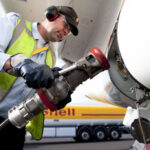Private and business aviation sustainability specialist 4AIR is to partner with the Aviation Impact Accelerator (AIA), a project led by the University of Cambridge to develop interactive, evidence-based tools to engage decision-makers, the aviation industry and the public about how to achieve ‘net zero flight’. Boston-based 4AIR will raise finance for the project through its Aviation Climate Fund, which uses contributions from its clients based on their carbon footprint to support research and development for future aviation technologies and emission reduction solutions. The company uses a four-step ratings programme with science-based goals for clients to work towards carbon neutrality, emissions neutrality and emissions reduction. The AIA project is an international group of academics and practitioners drawing on a broad range of expertise to build an interactive, open-source, whole system simulator that can map pathways and accelerate the journey to climate neutral aviation.
The four tiers of the 4AIR ratings programme start at Level 1 (Bronze), which requires a 100% offsetting of an individual’s or operator’s carbon emissions, progressing to Level 2 (Silver) in which non-CO2 pollutants must also be offset, and then to Level 3 (Gold), whereby clients go beyond carbon offsets and requires a 5% direct emission reduction through, for example, the use of sustainable aviation fuels.
All carbon credits purchased are quantified and verified through respected bodies such as American Carbon Registry, Climate Action Reserve, Verified Carbon Standard (Verra) and Gold Standard.
The highest Level 4, where the client is described as a ‘climate champion’, requires a direct contribution to the Aviation Climate Fund. The fund is intended to go in the form of grants and investments towards supporting university research in new technologies aimed at reducing aviation emissions. 4AIR says that during 2021, the fund supported research carried out by the Aviation Sustainability Center (ASCENT), the US aviation research organisation.
4AIR has recently launched an interactive SAF map for business jets to help operators with locations that could supply SAF. The company argues, however, that while carbon offsetting and SAF can help make much-needed progress, they are not by themselves enough to achieve a true zero impact.
“In order to meet ambitious sustainability goals such as ‘net zero flight’, we will need future technologies that enable actual emissions reductions within the industry beyond offsets and SAF,” said Kennedy Ricci, 4AIR President. “We launched the Fund to achieve this by supporting research and development for future aviation emission reduction solutions. Our partnership with the AIA will support bringing the leading academics and industry practitioners together to identify new paths to ‘net zero flight’.”
The Aviation Impact Accelerator project is led by the University of Cambridge’s Whittle Laboratory and the Cambridge Institute for Sustainability Leadership (CISL), and brings together a multidisciplinary team of experts from the University’s Department of Chemical Engineering, Hopkinson Laboratory, BP Institute, Judge Business School and Bennett Institute, together with the Air Transportation Systems Lab at University College London and the Melbourne Energy Institute at the University of Melbourne. The project is also partnered with the Prince of Wales’ Sustainable Markets Initiative, the World Economic Forum, Cambridge Zero, MathWorks and SATAVIA, with the input of industry advisors Rolls-Royce, Boeing, bp, Heathrow and Siemens Energy.
“Aviation is one of the most carbon-intensive forms of transportation and enabling the shift to ‘net zero flight’ will require a complete technological shift,” said Professor Rob Miller, Director of the Whittle Laboratory, who is co-leading the AIA project, who says climate change means a wait of 30 years to make zero-carbon flight a reality is too long. “I believe that this timescale can be cut in half and that we can have net zero carbon flight by 2035. But this can only become a reality if we radically change the way we develop and scale technologies,” he told the University’s alumni magazine CAM.
“We welcome 4AIR’s support in identifying solutions and developing ways to bring the full range of stakeholders into the debate about how best to achieve this ambitious, but absolutely critical, goal.”
At the COP26 side event below (scroll down), Professor Rob Miller and CISL’s Director of Policy, Eliot Whittington, explored the opportunities and challenges for climate neutral aviation. They provided a preview of the Aviation Impact Accelerator to demonstrate its potential to guide innovation, investment and policy action.













More News & Features
New studies confirm minor flight re-routing to avoid contrails would have major climate benefits
Aviation needs better measurement to deliver meaningful decarbonisation
More targeted and faster measures needed to overcome barriers and unlock SAF’s full potential, finds PA study
NATS survey shows a continuing disconnect of public attitudes to the environmental impact of flying
United invests in e-SAF start-up Twelve and next-gen blended wing aircraft developer JetZero
Heart Aerospace in surprise HQ move from Sweden to Los Angeles, citing bigger US opportunities